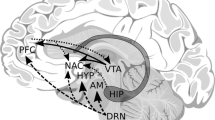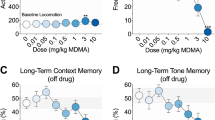Abstract
Rationale
Alcohol use disorders are associated with deficits in adaptive behavior. While some behavioral impairments that are associated with alcohol use disorders may predate exposure to drugs of abuse, others may result directly from exposure to drugs of abuse, including alcohol. Identifying a causal role for how alcohol exposure leads to these impairments will enable further investigation of the neurobiological mechanisms by which it acts to dysregulate adaptive behavior.
Objectives
In the present study, we examined the effects of chronic intermittent ethanol exposure (CIE) on the use of reward-paired cues to guide consummatory behaviors in a mouse model, and further, how manipulations of mGluR2/3 signaling—known to be dysregulated after chronic alcohol exposure—may alter the expression of this behavior.
Methods
Adult male C57B/6J mice were trained to self-administer 10 % ethanol and exposed to CIE via vapor inhalation. After CIE exposure, mice were trained in a Pavlovian task wherein a cue (tone) was paired with the delivery of a 10 % sucrose unconditioned stimulus. The use of the reward-paired cue to guide licking behavior was determined across training. The effect of systemic mGluR2/3 manipulation on discrimination between cue-on and cue-off intervals was assessed by administration of the mGluR2/3 agonist LY379268 or the antagonist LY341495 prior to a testing session.
Results
Exposure to CIE resulted in reductions in discrimination between cue-on and cue-off intervals, with CIE-exposed mice exhibiting significantly lower consummatory behavior during reward-paired cues than air controls. In addition, systemic administration of an mGluR2/3 agonist restored the use of reward-paired cues in CIE-exposed animals without impacting behavior in air controls. Conversely, administration of an mGluR2/3 antagonist mimicked the effects of CIE on cue-guided licking behavior, indicating that mGluR2/3 signaling can bidirectionally regulate the ability to use reward-paired cues to guide behavior.
Conclusions
Together, these data suggest that chronic ethanol exposure drives impairments in the ability to use reward-paired cues to adaptively regulate behavior and that mGluR2/3 receptors represent a therapeutic target for restoration of these deficits in behavioral control in the alcoholic.




Similar content being viewed by others
References
Arndt DL, Arnold JC, Cain ME (2014) The effects of mGluR2/3 activation on acute and repeated amphetamine-induced locomotor activity in differentially reared male rats. Exp Clin Psychopharmacol 22:257–65. doi:10.1037/a0035273
Barker JM, Torregrossa MM, Taylor JR (2012) Low prefrontal PSA-NCAM confers risk for alcoholism-related behavior. Nat Neurosci 15:1356–8. doi:10.1038/nn.3194
Barker JM, Zhang H, Villafane JJ et al (2014) Epigenetic and pharmacological regulation of 5HT3 receptors controls compulsive ethanol seeking in mice. Eur J Neurosci 6:999–1008. doi:10.1111/ejn.12477
Bartholow BD, Lust SA, Tragesser SL (2010) Specificity of P3 event-related potential reactivity to alcohol cues in individuals low in alcohol sensitivity. Psychol Addict Behav 24:220–228. doi:10.1037/a0017705
Brevers D, Bechara A, Cleeremans A et al (2014) Impaired decision-making under risk in individuals with alcohol dependence. Alcohol Clin Exp Res 38:1924–31. doi:10.1111/acer.12447
Corbit LH, Chieng BC, Balleine BW (2014a) Effects of repeated cocaine exposure on habit learning and reversal by N-acetylcysteine. Neuropsychopharmacology 39:1893–901. doi:10.1038/npp.2014.37
Corbit LH, Nie H, Janak PH (2014b) Habitual responding for alcohol depends upon both AMPA and D2 receptor signaling in the dorsolateral striatum. Front Behav Neurosci 8:301. doi:10.3389/fnbeh.2014.00301
DePoy L, Daut R, Brigman JL et al (2013) Chronic alcohol produces neuroadaptations to prime dorsal striatal learning. Proc Natl Acad Sci U S A 110:14783–8. doi:10.1073/pnas.1308198110
Depoy L, Daut R, Wright T et al (2014) Chronic alcohol alters rewarded behaviors and striatal plasticity. Addict Biol. doi:10.1111/adb.12131
Flagel SB, Watson SJ, Robinson TE, Akil H (2007) Individual differences in the propensity to approach signals vs goals promote different adaptations in the dopamine system of rats. Psychopharmacology (Berl) 599–607. doi: 10.1007/s00213-006-0535-8
Gourley SL, Olevska A, Gordon J, Taylor JR (2013) Cytoskeletal determinants of stimulus-response habits. J Neurosci 33:11811–6. doi:10.1523/JNEUROSCI.1034-13.2013
Griffin WC III, Haun HL, Hazelbaker CL et al (2013) Increased extracellular glutamate in the nucleus accumbens promotes excessive ethanol drinking in ethanol dependent mice. Neuropsychopharmacology. doi:10.1038/npp.2013.256
Hildebrandt H, Brokate B, Hoffmann E et al (2006) Conditional responding is impaired in chronic alcoholics. J Clin Exp Neuropsychol 28:631–45. doi:10.1080/13803390590949520
Jentsch JD, Taylor JR (1999) Impulsivity resulting from frontostriatal dysfunction in drug abuse: implications for the control of behavior by reward-related stimuli. Psychopharmacology (Berlin) 146:373–90
Kalivas PW (2009) The glutamate homeostasis hypothesis of addiction. Nat Rev Neurosci 10:561–72. doi:10.1038/nrn2515
Kareken DA, Bragulat V, Dzemidzic M et al (2010) Family history of alcoholism mediates the frontal response to alcoholic drink odors and alcohol in at-risk drinkers. Neuroimage 50:267–76. doi:10.1016/j.neuroimage.2009.11.076
Kufahl PR, Martin-Fardon R, Weiss F (2011) Enhanced sensitivity to attenuation of conditioned reinstatement by the mGluR 2/3 agonist LY379268 and increased functional activity of mGluR 2/3 in rats with a history of ethanol dependence. Neuropsychopharmacology 36:2762–73. doi:10.1038/npp.2011.174
Lopez MF, Becker HC, Chandler LJ (2014) Repeated episodes of chronic intermittent ethanol promote insensitivity to devaluation of the reinforcing effect of ethanol. Alcohol. doi:10.1016/j.alcohol.2014.09.002
Mead AN, Stephens DN (2003) Involvement of AMPA receptor GluR2 subunits in stimulus—reward learning: evidence from glutamate receptor gria2 knock-out mice. October 23:9500–9507
Meinhardt MW, Hansson AC, Perreau-Lenz S et al (2013) Rescue of infralimbic mGluR2 deficit restores control over drug-seeking behavior in alcohol dependence. J Neurosci 33:2794–806. doi:10.1523/JNEUROSCI.4062-12.2013
Olive MF (2009) Metabotropic glutamate receptor ligands as potential therapeutics for addiction. Curr Drug Abuse Rev 2:83–98
Ripley TL, Borlikova G, Lyons S, Stephens DN (2004) Selective deficits in appetitive conditioning as a consequence of ethanol withdrawal. Eur J Neurosci 19:415–25
Sanchez-Roige S, Baro V, Trick L et al (2014) Exaggerated waiting impulsivity associated with human binge drinking, and high alcohol consumption in mice. Neuropsychopharmacology. doi:10.1038/npp.2014.151
Saunders BT, Robinson TE (2013) Individual variation in resisting temptation: implications for addiction. Neurosci Biobehav Rev. doi:10.1016/j.neubiorev.2013.02.008
Sjoerds Z, de Wit S, van den Brink W et al (2013) Behavioral and neuroimaging evidence for overreliance on habit learning in alcohol-dependent patients. Transl Psychiatry 3:e337. doi:10.1038/tp.2013.107
Sjoerds Z, van den Brink W, Beekman ATF et al (2014) Response inhibition in alcohol-dependent patients and patients with depression/anxiety: a functional magnetic resonance imaging study. Psychol Med 44:1713–25. doi:10.1017/S0033291713002274
Acknowledgments
The authors would like to thank Laura Ralston for her expert technical assistance. This work was supported by NIH grants AA007474 and AA023141 (JMB) and AA010761 (LJC).
Author information
Authors and Affiliations
Corresponding author
Rights and permissions
About this article
Cite this article
Barker, J.M., Lench, D.H. & Chandler, L.J. Reversal of alcohol dependence-induced deficits in cue-guided behavior via mGluR2/3 signaling in mice. Psychopharmacology 233, 235–242 (2016). https://doi.org/10.1007/s00213-015-4101-0
Received:
Accepted:
Published:
Issue Date:
DOI: https://doi.org/10.1007/s00213-015-4101-0




